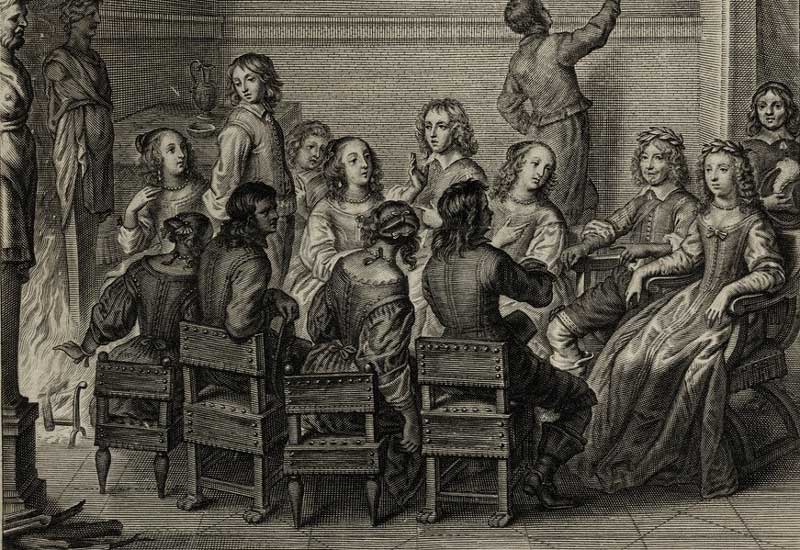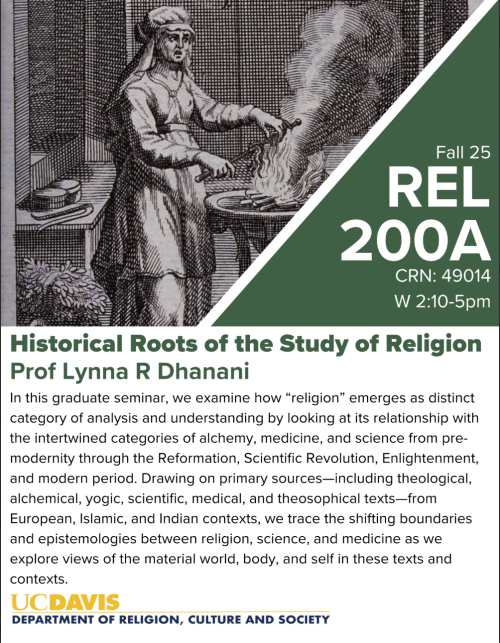Winter 2026
HIS 201S Science and Empire, 1500-1900
Section 001 (CRN: 40513)
Location: SSH 4202
Time: T, 3:10-6:00 PM
Instructor: Stolzenberg, Daniel
This graduate seminar surveys the intertwined histories of sciences and empires from the age of Columbus to the apogee of European colonialism at the turn of the twentieth century. Reading a combination of secondary and primary sources, we will investigate how empires shaped the development of scientific disciplines; how scientific knowledge and expertise served imperial projects; and how indigenous knowledge contributed to colonial science. The scientific dimension of European imperialism will be a major theme, including the ideological function that the idea of “modern science” played in forming European/Western identity and justifying colonialism. At the same time, we will consider recent studies of science in non-Western imperial contexts, such as the Ottoman Empire, China, and Japan. History students can count this class toward the minor in World History as well as Science and Medicine. It also counts toward the STS DE.
SPA 259 Cervantes and the Novel
Section 001 (CRN: 40672)
Location: Olson 109
Time: T, 4:10-7:00 PM
Instructor: Gutierrez-Flores, Daniela

Fall 2025
ENL 246: Cosmocriticism and Celestial Entanglements from Copernicus to Cavendish
- (CRN: 49380); W 12:10-3:00 PM; Seminar Voorhies Hall 396
- Werth, T.
This course examines how historical celestial aspirations, from Copernicus to the heliocentric revolution and imagined lunar voyages, shape contemporary attitudes toward space exploration. Recent Presidential proclamations to “plant the stars and stripes on Mars” revitalize a long history of celestial imaginings within western culture. Yet conventional nationalist rhetoric seldom examines the cultural attitudes that help grow such ambitions. This study heeds medievalist Carl Phelphstead’s call for “cosmocriticsm,” to examine how attitudes toward heaven shape those on earth. Its methodology draws upon recent schools of thought under the rubric of posthumanist theory that seeks to respond to the entangled relations of systems, bodies, and species. Its archive will be early modern literary texts, visual culture, and astronomical instruments and observatories to connect past imaginings of the heavens with modern space ethics. Participants in the seminar may have opportunities to join two related research events, a symposium on the early modern sky sponsored by the UCLA Clark Library (Feb 26) and a Newberry Library / Adler Planetarium workshop (April 26). This class will cover seminal literary texts from the 16th and 17th century historical fields lists. Spring 2025
![Image from Petrus Apianus Astronomicum Caesareum [Ingolstadt: Factvm et actvm Ingolstadii in aedibvs nostris, Anno a Christo nato sesqvimillesimo qvadragesimo mense maio [1540]. Huntington Library RB 32891.](/sites/g/files/dgvnsk9516/files/styles/sf_medium_width/public/media/images/Screenshot%202025-05-17%20at%2023.09.50.png?itok=Rj3hTZAu)
Image from Petrus Apianus Astronomicum Caesareum [Ingolstadt: Factvm et actvm Ingolstadii in aedibvs nostris, Anno a Christo nato sesqvimillesimo qvadragesimo mense maio [1540]. Huntington Library RB 32891.
PHI 290: Women and Gender in Early Modern Philosophy
- M 3:10-6:00 PM; SSH 232
- Naranjo Sandoval, A.
What did Poulain de la Barre mean when he confidently announced that “the mind has no sex” centuries before social constructionism about gender was first articulated and defended?
Why did Gabrielle Suchon advocate for a “celibate life, freely chosen” as a way for women to achieve happiness?
A central part of Anne Conway’s theodicy is that not all divine punishment and reward occur in the afterlife but is instead doled out via a system of reincarnation. In particular, human beings who are “brute in spirit” (VI.7, p.36) are punished by being reincarnated as animals and, on the other hand, animals which act rationally are rewarded by returning to life as human beings. But why is a brutish life worth punishing and a rational life worth rewarding? And is it just to punish an agent for acting brutely by turning them into a brute, considering that this might make it harder for them to achieve a more perfect life?
These questions are rarely discussed in seminars on early modern philosophy, in part because the story of this period as it is usually taught is full of glaring omissions, both in terms of the topics represented and the figures deemed worth including. This seminar is meant to help address some such lacunae by focusing on (1) theories of gender and gender inequality; (2) discussions by
women on the essence of the human being and its relation to the body; and, relatedly, (3) discussions by women regarding the achievability of happiness in an imperfect – and often sexist – world.
Although some acquaintance with early modern philosophy would certainly be welcome, it is not presupposed. This seminar will be accessible to any graduate student or highly motivated advanced undergraduate.

REL 200A: Historical Roots of the Study of Religion
- (CRN: 49014); W 2:10-5:00 PM; Seminar Voorhies Hall 396
- Dhanani, L.
In this graduate seminar, we examine how “religion” emerges as distinct category of analysis and understanding by looking at its relationship with the intertwined categories of alchemy, medicine, and science from pre-modernity through the Reformation, Scientific Revolution, Enlightenment, and modern period. Drawing on primary sources—including theological, alchemical, yogic, scientific, medical, and theosophical texts—from European, Islamic, and Indian contexts, we trace the shifting boundaries and epistemologies between religion, science, and medicine as we explore views of the material world, body, and self in these texts and contexts.

Spring 2025
PHI 290: History of Philosophy
- (CRN: 55992); 3:10-6:00; Social Sciences & Humanities 2275
- A. Naranjo Sandoval
Winter 2025
Classics (CLA) 200A: Approaches to the Classical Past
- (CRN: 56636); W 3:10-6; TLC 2000E
- Ralph Hexter
French (FRE) 207A: 18th-Century Literature: Philosophies - "Decadence and the Memoir"
- (CRN: 41461); T 2:10-5; Olson 144
Course Description: This course will consider one of the world’s longest and most controversial autobiographies, Giacomo Casanova’s Histoire de ma vie, and place the infamous Venetian conman in the context of his time, with an emphasis on eighteenth century gender politics, morality and philosophy.
History (HIS) 201Q: Cross-Cultural Women's History
- (CRN: 41805); W 3:10-6; SSandH 4202
Course Description: This year’s 201Q will examine the diverse ways that gender has shaped colonial projects, colonial subjecthood, and post-colonial nation building. Readings will cover North America, Latin America, Africa, and Asia and will explore a range of themes through comparative and transnational frameworks. These topics include knowledge and power, suffrage and citizenship, masculinity, multiracial identities, sexuality and reproduction, anticolonial revolution, and post-colonial reparations.
Tentative Reading List
- Benedict Anderson, Imagined Communities: Reflections on the Origins and Spread of Nationalism (Verso, 1983).
- Laura Briggs, Reproducing Empire: Race, Sex, Science, and U.S. Imperialism in Puerto Rico (UC, 2003).
- Antoinette Burton, Burdens of History: British Feminists, Indian Women, and Imperial Culture, 1865-1915. (UNC, 1994).
- Tanya Harmer, Beatriz Allende: A Revolutionary Life in Cold War Latin America (UNC, 2020).
- Rachel Jean-Baptiste, Multiracial Identities in Colonial French Africa: Race, Childhood, and Citizenship (Cambridge, 2022).
- Adria L. Imada Aloha America: Hula Circuits through the U.S. Empire (Duke, 2012).
- Edward Said, Orientalism (Verso, 1978)
- Tiffany A. Sippial, Celia Sánchez Manduley: The Life and Legacy of a Cuban Revolutionary (UNC, 2003).
- Elizabeth Thompson, Colonial Citizens: Republican Rights, Paternal Privilege, and Gender in French Syria and Lebanon (Columbia, 2000).
Philosophy (PHI) 290: History of Philosophy
- (CRN: 34402); R 3:10-6; SS&H 2275
- Jan Szaif